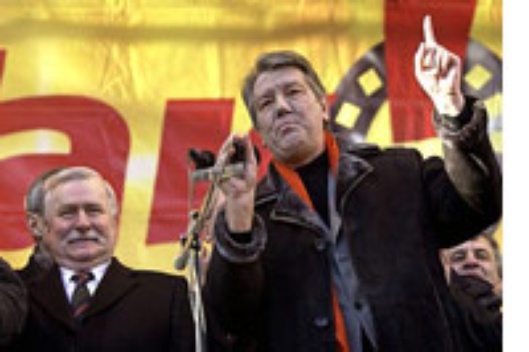All for one and one for all?
Published on
The overwhelming image of the situation in Ukraine is that the majority of people are behind the opposition leader, Yushchenko. Jarek Domanski, an election observer for an international organisation, reports on whether or not this is true
 I flew to Kiev a couple of days before the second round of the Ukrainian presidential elections, which took place on November 21st. There had already been a great deal of political activity following the first round, with many cars displaying orange flags as a sign of support for the opposition candidate, Viktor Yushchenko. By the time I arrived, the entire city of Kiev was orange, except for Yanukovich-commissioned billboards. In Kiev’s Independence Square (Maidan Nezalezhnosti), the opposition held meetings before thousands of people and, as Yushchenko was leading most exit-polls by a significant margin, the mood was positive.
I flew to Kiev a couple of days before the second round of the Ukrainian presidential elections, which took place on November 21st. There had already been a great deal of political activity following the first round, with many cars displaying orange flags as a sign of support for the opposition candidate, Viktor Yushchenko. By the time I arrived, the entire city of Kiev was orange, except for Yanukovich-commissioned billboards. In Kiev’s Independence Square (Maidan Nezalezhnosti), the opposition held meetings before thousands of people and, as Yushchenko was leading most exit-polls by a significant margin, the mood was positive.
Solidarity in the capital
After the publication of the preliminary results by the Central Election Committee, which named Yanukovich as the winner, things reached fever pitch. Already on Monday afternoon, there were at least 100,000 people in the square, most of them displaying something orange. Despite heavy snow-fall and freezing temperatures, opposition supporters remained there all day and night, cutting off Kiev’s main street, Khreshchatik, and erecting tents. There is a huge amount of energy and solidarity among the Yushchenko supporters, demonstrated by old ladies who, despite their difficult financial situation, are distributing homemade cakes and sandwiches, hot tea and coffee as well as warm clothes. By the time of my departure, a whole city of tents had emerged and several thousand people (mostly students) were continuing to spend their nights on Khreshchatik and in the square. Life in this make-shift metropolis is well organised - rubbish is even being removed on a regular basis.
It is incredible how politicised the people in Kiev are, and everyone from taxi drivers to shop assistants are discussing the situation and speaking openly about their political views. This is reflected in the wide variety of people taking to the street: students and pensioners; academics and workers; even whole school classes are skipping their lessons to shout anti-Kuchma slogans. In the main square, people are still there, waving flags and dancing in the streets after midnight despite the cold and snow. Among the many Ukrainian flags are numerous Polish, Georgian and Belarusian ones, showing how people from other countries have come to the capital to back the Ukrainian opposition. Last Thursday, former Polish President Lech Walesa joined the crowd declaring his solidarity with, and endorsement of, the opposition and Yuschenko.
Fear elsewhere
However, Kiev is not representative of all of Ukraine, as I found when I spent a few days working as an election observer in the autonomous republic of Crimea. In Crimea, which is ethnically mostly Russian, the people are afraid of Yushchenko who, in their eyes, is a nationalist that wants to replace the three official languages of the peninsula by Ukrainian. Likewise, people from Eastern Ukraine are culturally and economically linked to Russia and don’t like Yushchenko’s pro-Western stance, because in their minds this is connected to losing their rights and identity. The protests are thus, in my view, less in favour of Yushchenko (who, as most people admit, is far from being an ideal candidate) than against power structures which do not take the population seriously and have relied too long on its passivity.
But after eight days in Ukraine, I am quite optimistic. No matter what the outcome, there can be no return to the status quo of deeply corrupt power structures, of three economic clans dividing the country’s spoils amongst themselves and of politicians caring about little but their own survival. Already, two previously government-controlled TV channels have vowed to report objectively and stand up to censorship while the Kiev police, as well as some of the military, now openly support the opposition. However, reforming the situation will take years and need a lot of determination. I saw the willingness of the Ukrainian people to strive for this reform, but they need our support to do so - rather than the disinterest that we have shown them until now.



